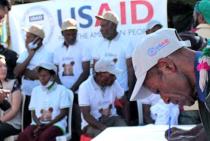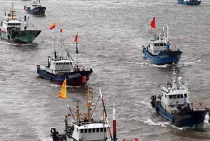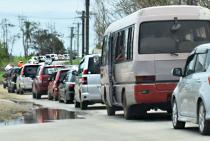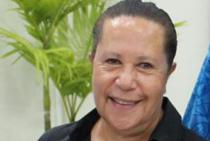Although the Trump administration is now attempting to walk back some of the most obviously murderous aspects of its aid freeze, its ramifications remain: the damage already done, the effects on work still covered by the freeze, the apparent demise of USAID, the sheer capriciousness of the decision. While impacts on other parts of the world have dominated the headlines, the decision is going to be felt in the Pacific too. The region is the world’s most aid-dependent. - Terence Wood.
You are here
Results for Op-Ed Global Development
Friday 7 February 2025
Canberra, Australia
Monday 23 September 2024
Canberra, Australia
Aid agencies are capable of learning and adapting if they invest in the systems and deep local partnerships that enable them to understand the sources of change, have the expertise and authority to use this knowledge to shape and adapt their programs, and are humble enough to acknowledge failure and make corresponding changes. The Australian Government has said it will...drive evaluation quality to ensure that evaluation findings inform policy and program decision making. But you wouldn’t know this from reading the plans. - By Cameron Hill
Thursday 14 March 2024
Manuka ACT, Australia
The Pacific Australia Labour Mobility scheme lures workers from Pacific Island Nations and Timor-Leste with promises of opportunity and money. Yet once workers arrive in Australia, they have to face the reality of poor working and living conditions. Tonga is home to one of the largest cohorts of Pacific Islanders who come to work in Australia on PALM visas - equivalent to 9% of the Tongan working age population. The bigger issue with this kind of temporary labour scheme is the impact they have on Pacific economies. The PALM Scheme is large, and it is growing – fast. By Alexia Adhikari
Thursday 9 March 2023
Suva, Fiji
International Women’s Day (IWD) puts a spotlight on the achievements of women and girls everywhere. It is the day of recognition and celebration of the strides which have been made to advance gender equality and women’s empowerment. It also provides an opportunity for self-reflection on our actions (or lack thereof) as leaders, institutions, and governments, to enhance the lives of women through opportunity, inclusion and equality. Excluding women incurs massive costs.
Tuesday 11 October 2022
Sharm El-Sheikh, Eqypt
Some fear that this year’s United Nations Climate Change Conference – to be held here in Egypt on November 6-18 – will be an unintended casualty of the geopolitical tensions and economic challenges the world is facing. I believe the opposite: COP27 represents a unique and timely opportunity for the world to come together, recognize our common interests, and restore multilateral cooperation. As daunting as this challenge is, we have no choice but to confront it. We must negotiate with one another, because there can be no negotiating with the climate. By Sameh Shoukry, COP27 President-Designate.
Thursday 28 July 2022
Birmingham, United Kingdom
Today, over 5000 competitors from nations as far afield as Malaysia to Jamaica converge on Birmingham for the Commonwealth Games. The Games is perhaps the most visible aspect of the Commonwealth for many of our 2.5 billion citizens. Less visible, and appreciated, is the potential of the Commonwealth to bolster trade, business and investment between our 56 members. Tonga could win every year through the Commonwealth advantage. We must also work collectively to overcome perceived investment risks within some of our developing countries. - Lord Jonathan Marland of Odstock, Chair of the Commonwealth Enterprise and Investment Council.
Sunday 28 November 2021
Auckland, New Zealand
For years, WTO members have failed to forge an agreement to limit fishing subsidies, thereby allowing the continuation of ecologically devastating fishing operations that would otherwise be economically unviable. Now an agreement is within reach – if the political will is there to deliver it. The comprehensive draft now on the table combines measures to curb harmful subsidies with specific exceptions for developing countries. Governments have given their word that they will curb destructive fisheries subsidies. This week’s 12th Ministerial Conference in Geneva (30 Nov.-3 Dec.) will test the credibility of that pledge. By Helen Clark, et al.
Tuesday 13 July 2021
Rome, Italy
Humanity is drifting into increasing danger. Climate change is accelerating; biodiversity is plummeting; hunger and extreme poverty are rising; and the gap between rich and poor is widening. These trends threaten not only human health and livelihoods, but also global peace and stability. Reversing them will require a shared effort to rebuild, and even upgrade, the systems on which we all depend – beginning with the global food system. By Gilbert F. Houngbo
Thursday 27 May 2021
Cambridge, United Kingdom
For over a century, the size and role of the state has been a hotly debated issue, and is so once again in the wake of COVID-19. With the world reeling from the pandemic and struggling to address complex systemic issues such as climate change, it is vital that we return to the fundamental question of politics: how a government should be. If we don’t ask it – and ask it often – we risk ending up with a government we would never choose. By Jaideep Prabhu
Friday 20 November 2020
London, United Kingdom
For much of its life, the United Nations has hidden behind the comfortable maxim that, “If we didn’t have it, we would have to invent it.” Now at the venerable age of 75, the organization still enjoys widespread approval in global opinion polls. But beneath the surface, the UN faces difficulties that cannot be ignored. The Security Council will remain ineffectual until it is reformed, which is a distant prospect. But there are ways around this paralysis. By Mark Malloch-Brown.
Thursday 19 November 2020
Melbourne, Australia
COVID-19 continues to have a devastating impact on public health and to rattle the global economy with structural shocks. The pandemic has now killed more than one million people, while the International Monetary Fund estimates that global GDP will shrink by 4.4% in 2020. But, strange as it may seem, the current crisis could offer developing countries a path toward greater economic self-reliance. By Syed Munir Khasru.
Thursday 15 October 2020
Queensland, Australia
At the start of the year, when COVID-19 was ravaging Wuhan, China, and beginning to envelop the West, I warned that the crisis would likely be replicated across much of the developing world, with significant long-term consequences for us all. Sadly, this prediction was correct....At the global level, the challenge is to ensure that vulnerable people everywhere are protected. Failing that, we will be entering a much more dangerous world, and the prospects for a robust global economic recovery will be severely diminished. By Kevin Rudd
Monday 10 August 2020
1 comment
London, United Kingdom
This week's dialogue on economic strategies by the Forum Economic Ministers' Meeting, 11-12 August, is critical to building back better, or differently, for the Pacific Forum Islands. By Amelia Kinahoi Siamomua. (Tonga’s candidate for the post of Secretary General of the Pacific Islands Forum Secretariat).
Friday 19 June 2020
1 comment
Suva, Fiji
The COVID19 pandemic has upended economies the world over, while there is financial pain there is also an opportunity for the reorganisation of national and global economics. Fiji's economic fault lines have been exposed under the pressures of COVID-19, exposing the gaps through which people and communities are falling. As governments continue to act to support economies undone by the pandemic it's important to see that any community relief that is being offered also has an eye to the future. By Maureen Penjueli.
Thursday 18 June 2020
Bangkok, Thailand
CoViD-19’s effects on health, jobs and economies are simply an acute version of what climate change is predicted to bring – and in places already has. Unless we aspire to a better normal with recovery, we are treating the symptom, not the disease. We must build back better than before. For example, it may be tempting to scale up funds for infrastructure like roads, but that funding can go to improved and greener public transport systems to service more people. More public transit capacity will reduce the load on roads and reduce air pollution and emissions. Investment in IT can decentralize business operations, reducing time lost and carbon produced in commutes and travel. By Armida Alisjahbana and Inger Andersen.
Wednesday 5 February 2020
Potsdam, Germany
Today’s leaders must not bequeath a dangerously destabilized planet to future generations. This is why the Nobel Foundation is hosting its first-ever Nobel Prize Summit, with the theme “Our Planet, Our Future,” in Washington, DC, from April 29 to May 1. The summit – supported by the US National Academy of Sciences, the Potsdam Institute for Climate Impact Research, and the Stockholm Resilience Centre/Beijer Institute – will bring together more than 20 Nobel laureates and other experts from around the world to explore the question: What can be achieved in this decade to put the world on a path to a more sustainable, more prosperous future for all of humanity? By Johan Rockström, Lars Heikensten, and Marcia McNutt.
Tuesday 1 October 2019
1 comment
Beijing, China
The celebration of the 70th anniversary of the founding of the People’s Republic of China on October 1 will be an exuberant affair, involving glitzy cultural events, an extravagant state dinner attended by Chinese and foreign luminaries, and a grand military parade in Tiananmen Square. And, at a time of high tensions with US President Donald Trump’s administration, it will be imbued with an extra dose of patriotic enthusiasm. But while China has much to celebrate, it also has much work to do. By Keyu Jin.
Tuesday 24 September 2019
Paris, France
In a profoundly volatile world riddled with fractures, the temptation to embrace a seemingly reassuring path of withdrawal or isolation may be strong. In fact, avoidance of potential hazards seems only natural. For lack of a better alternative, we may be instinctively inclined to look inward in order to circumvent or at least mitigate the risks of a world that feels like end times, in which children are telling us the truth. By Rémy Rioux.
Wednesday 7 August 2019
New York, USA
In last year’s Pathways for Peace report – the result of a joint study by the United Nations and the World Bank – UN Secretary-General António Guterres warned that the world is facing a “dramatic resurgence” of conflict, which has caused immense human suffering and significantly undermined global order. If the world is to achieve the UN Sustainable Development Goals (SDGs) – and protect millions of people from deadly violence – urgent action must be taken to reverse this trend. By Rachel Locke and David Steven.
Tuesday 19 February 2019
Port Vila, Vanuatu
A key challenge for the Forum is to maintain its solidarity as staunchly pro-Blue Pacific...where we are custodians of some of the world’s richest biodiversity and marine and terrestrial resources. Leaders have articulated a desire for a shift in the development trajectory for the Pacific, through the Blue Pacific narrative and through it the opportunity to exercise our will. This is the strategic lens through which any conversation over China, and the associated geopolitical and geostrategic environment we find ourselves in, must occur. Our political conversations and settlements must be driven by the well-being of our Blue Pacific continent and its people, not by the goals and ambitions of others. By Dame Meg Taylor.






















